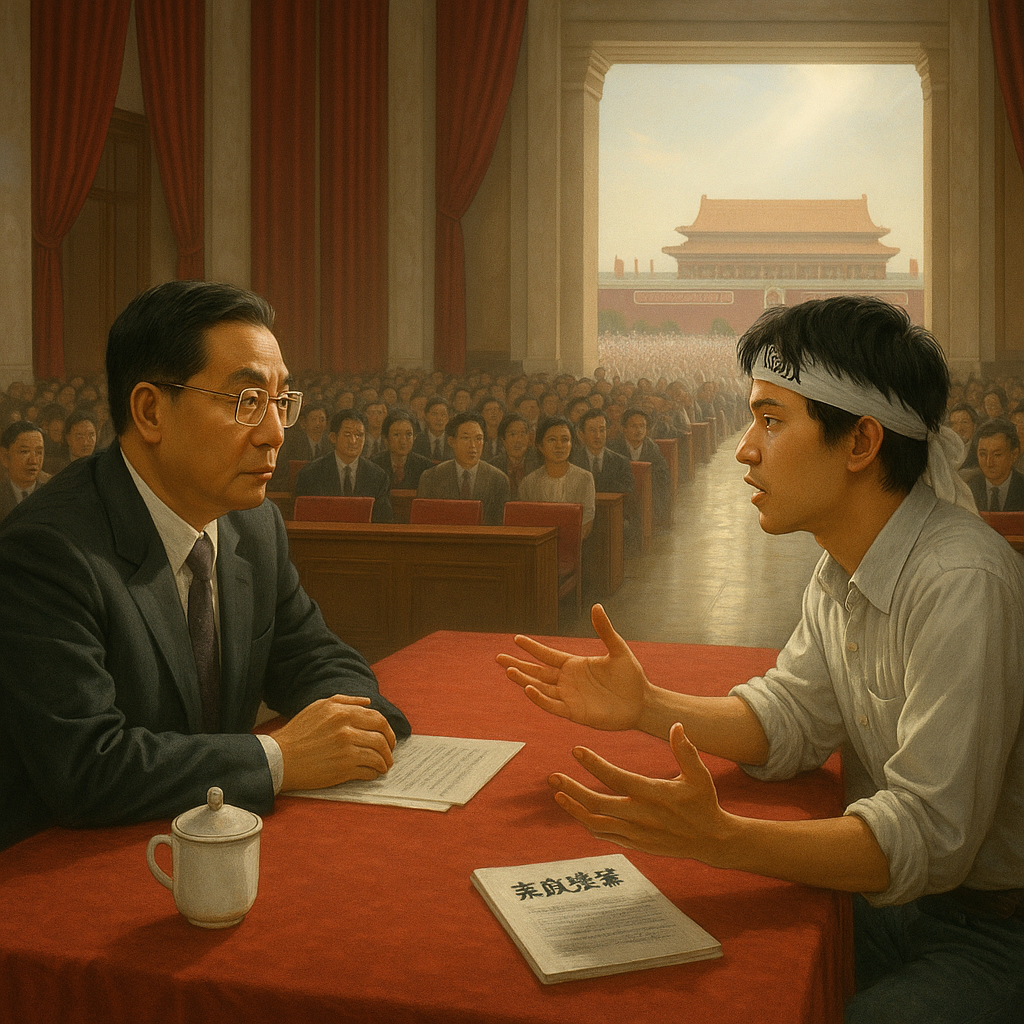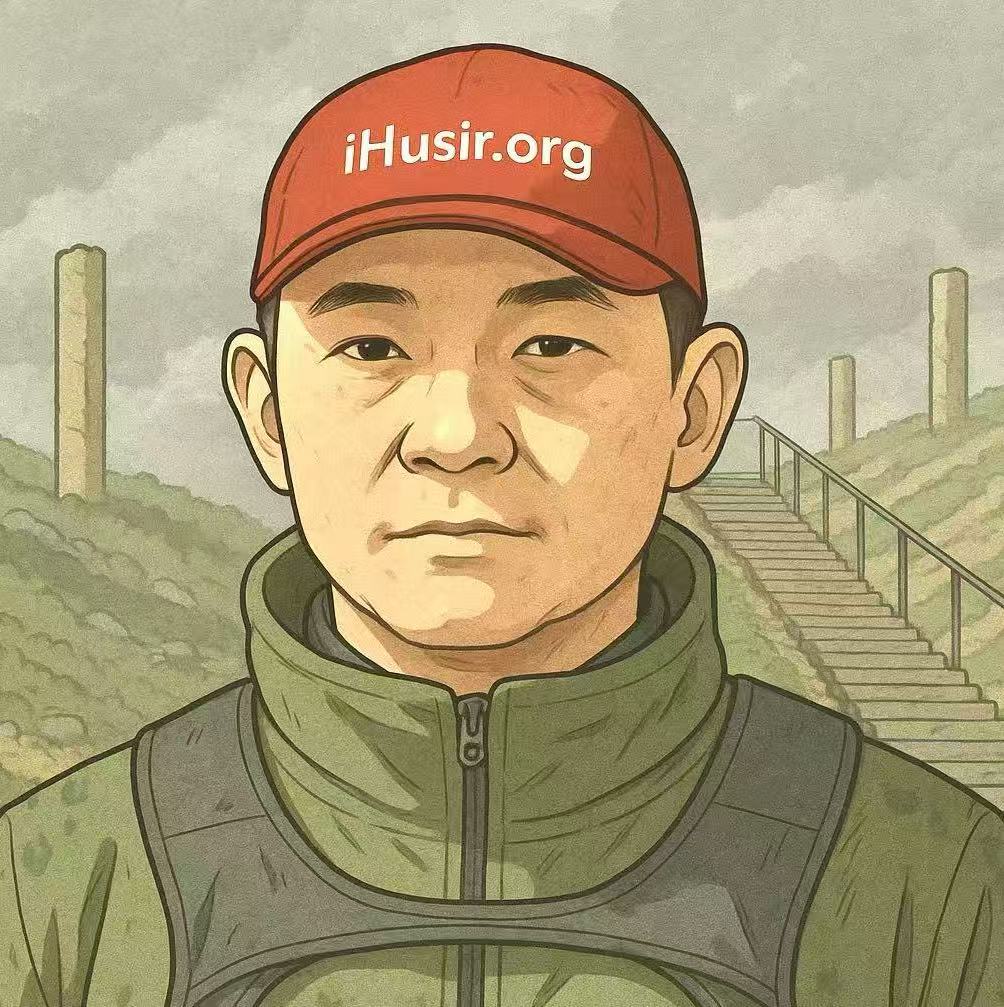——关于1989年未竟对话的历史设想
文/MingSir
1989年6月的那个夏夜,注定写入了历史。但我们今天不再追问伤痕,而是想象:如果那场学生运动最终不是以镇压结束,而是以一次公开、真诚的对话落幕,中国将走向何方?
假如当年谈成了,历史是否会有另一种光?
一、政治:可能打开宪政改革的闸门
如果中共高层在当时选择了对话而非镇压,最可能出现的将是“渐进式的政治改革”:
党内改革派掌握更多主导权,如赵紫阳提出的“党政分开、制度反腐、新闻开放”将逐步落实;新闻自由与司法独立将出现试点,政府与人民之间的信任度将不再靠维稳维持,而靠法治与回应;人大代表制度和地方选举权将真实运转,百姓参与治理、表达意见的渠道逐渐合法化、常态化。
这样一来,中国不会直接迈入西方式民主,但可能走出毛泽东时代的独裁惯性,迈入一个“可批评、可监督”的半自由体制,像韩国、台湾那样完成转型的基础。
二、社会:公民意识觉醒,沉默不再成为常态
一场不被镇压的改革运动,将唤醒整个社会的责任感与自我治理意识:
NGO、公民媒体、独立工会将率先成长,中国社会将形成健康的第三部门;青年将更早习惯公开表达意见,而不是“自保与犬儒”;公共讨论成为日常生活的一部分;“稳定压倒一切”不会成为铁律,而是让位于“公义与对话”。
几十年后的今天,“冷漠地围观、理性地沉默”将不再是中国人的日常,而是“理直气壮地说理、诚实地承担责任”的社会气氛成为主流。

三、若诉求被接纳:八大呼声将打开改革契机
1989年学生运动并非无理取闹,而是提出了清晰、理性的八大诉求,其核心并不是推翻体制,而是追求反腐、公正、新闻自由与政治透明。假如当年国家领导层愿意聆听并回应这些呼声,中国社会的制度生态将被彻底激活。
若以下核心诉求被接纳、逐步落实,将带来深远影响:
- 第一,新闻自由将逐步实现。若政府允许媒体公开报道社会问题、开放部分非官方舆论平台,中国将提早形成舆论监督机制,腐败、冤案、资源错配等问题将更早得到抑制。而不是像今天,记者这一行业在中国已名存实亡。
- 第二,官员财产公开与反腐机制建设将起步。如果党政机关干部能启动财产申报制度,将为今天中国无处不在的特权资本主义画上制度底线。即便是与台湾实现统一,两个板块的官员也可以在这方面保持一致了。
- 第三,政治体制改革得以启动。学生要求“党政分开”,并非推翻政权,而是盼望国家治理专业、法治、透明。若此得行,国家将不再靠运动治国,而走向制度理性。
- 第四,允许学生自组织,将为中国社会带来一代具有公民意识、参与意识的青年骨干,而非唯考试论与唯服从论之下的“犬儒青年”,更不是外卖大军的接班人。
- 第五,设立“国家历史反思委员会”,对“文革”“反右”等历史事件进行公开审查与和解,将重建集体记忆与民族尊严,更不会出现三年疫情的民族悲剧。
这些诉求并不激进,而是现代文明社会最基本的制度愿景。如果当年谈成了,这些呼声将成为制度进步的起点,而非镇压的导火索。
四、经济:避免“权贵资本主义”的畸形路径
不镇压的中国不会放弃市场经济,但将走上一条更加健康、制度友善的经济现代化道路:
权力与资本的结合会受到更强的制度遏制,从而抑制“红色家族资本垄断”的结构性腐败;中产阶级将以“纳税人+参与者”的身份崛起,不只是房奴与沉默者,而是积极参与社会事务的责任群体;企业创新和区域平等将更早受到制度保障,防止国企垄断与体制寻租吞噬经济活力。
结果不是“经济更差”,而是更可持续、更公平、更具创造力的中国。
五、文化:自由、反思与批判精神复兴
一场不以枪声结束的改革,将给中国文化注入新的灵魂:
作家、艺术家、知识分子将恢复“时代良知”的地位,不是唱赞歌,而是提出问题,引发思考;历史将不再是“选择性记忆”,而是全民参与的公共工程,真实成为民族共同体的核心资源;互联网不会成为被围墙圈养的局域网,而是思想开放与灵魂碰撞的自由场域。
中国将不再是“怕说真话的国度”,而是“有能力直面真相并修正错误的国度”。
六、信仰:中国教会提前迎来复兴黄金时代
最深远的转变,也许在灵魂之处。
如果当年谈成了,家庭教会就不会长期被逼入地下,而是有可能在合法的灰色地带中成长;更多人将早一点听到福音,并自由地选择是否归信,而不是以代价巨大的方式摸索属灵真理;中国的信仰反思(例如“悔改、舍己、担当”)将更早与社会伦理和国家命运对话,形成公共神学传统。
信仰将不再是隐秘的个体挣扎,而成为民族复兴、社会更新、文化赎回的一部分。
七、历史的重量:为什么不能谈、谁不想谈?
说到底,当年为何不能谈?为何宁愿“开枪”也不愿“让一步”?因为“谈判”本身就意味着承认人民有发言权、有公义诉求、有独立人格——这正是极权结构最惧怕的。它不能允许真相、不能承受反省、不能忍受良知。这也正是为什么三十多年后的今天,“六四”依旧是中国记忆中的禁区。
不被允许谈论的历史,正是最值得我们反复回望的地方,是整整一代人压在心里的痛,是被子孙后代瞧不起的痛。
八、如果“六四”发生在今天,我们应提出怎样的诉求?
假如“六四”那样的全国性民意表达重现于今天,面对更加系统化的压制、更加高科技的信息控制、更深层的制度僵化,中国人民与信仰群体应当提出怎样的诉求?今天的诉求,不应再是抽象的“民主”与“自由”口号,而应是具象、制度化、面向现实根源的十项呼声:
首先是制度建设层面,我们必须要求:
- 官员财产全面公开,并设立独立反腐机制,终结家族化权力资本;
- 让人大实权化,接受质询与媒体监督;
- 推动党政分离,行政体系去除意识形态主导。
其次是在公民权利方面,我们必须要求:
- 废除《寻衅滋事》等口袋罪,停止因言治罪,恢复言论自由;
- 新闻机构脱离宣传管控,赋予记者调查权;
- 推动司法独立,重建法律面前人人平等的信心。
在社会福祉方面,必须回应人民的基本关切:
- 医疗体系去商业化,避免因病返贫;
- 教育公平化,遏制区域与阶层垄断;
- 废除户籍制度,实现城乡平等。
而在历史正义方面,一个成熟民族必须有面对伤痕的勇气:
- 建立“历史真相与和解委员会”,对文革、反右、六四、疫情等事件进行官方审视与社会修复。
这些,不是激进革命的纲领,而是一个现代国家恢复常识与尊严的基本步骤。
如果今天还不能谈,那我们要为未来争取谈的机会;
如果今天还不能说,那我们要守住良知不被熄灭。
结语:历史没有如果,但信仰有回应
历史不能重来,但我们可以用属灵的眼光来回应它。我们不能决定1989年是否谈成,但我们可以决定——
今天,是否愿意站出来发出诚实的声音;
今天,是否愿意面对历史、面对罪、面对悔改;
今天,是否愿意为这个国家、这个民族,为下一代,承担一点点真实的十字架重量。
愿中国的未来,不再需要流血的呼喊,而是在悔改中走向光明。
If the “Capital Universities’ Student Autonomous Federation” Had Negotiated Successfully
— A Historical Speculation on the Unfinished Dialogue of 1989
By MingSir
June 1989’s hot summer night was destined to be written into history. But today we no longer focus on the wounds; instead, we imagine: What if that student movement had ended not with a violent crackdown but with an open, sincere dialogue? How might China’s path have changed?
If they had negotiated successfully back then, might history have shone a different light?
I. Politics: Opening the Door to Gradual Constitutional Reform
Had the Party leadership in 1989 chosen dialogue over force, China would likely have seen gradual political reform:
- Reformers within the Party (e.g. Zhao Ziyang) would have gained influence, implementing measures such as “separating Party and government, institutional anti-corruption, and opening up the press.”
- Pilot programs for press freedom and judicial independence would have begun, rebuilding trust between government and people through the rule of law rather than repression.
- Direct elections for People’s Congress deputies and real local electoral power would have emerged, giving citizens genuine channels to participate in governance.
China might not have adopted full Western-style democracy overnight, but it could have broken free from Mao-era autocracy and entered a “semi-liberal” system—“criticism and oversight allowed”—similar to South Korea or Taiwan’s democratic transitions.
II. Society: Civic Awareness Awakens, Silence No Longer the Norm
A reform movement that avoided a crackdown would have ignited a sense of responsibility and self-governance across society:
- NGOs, independent media, and labor unions would have thrived first, forming a healthy third sector.
- Young people would have learned to speak out publicly earlier, abandoning a default of self-preservation and cynicism.
- Public debate would have become part of everyday life, and “stability at all costs” would have yielded to “justice through dialogue.”
Decades later, the norm would not be “indifferent bystanders and rational silence,” but “speaking up boldly and taking responsibility honestly.”

III. If Their Demands Had Been Met: The Eight Calls That Could Have Launched Reform
The 1989 student movement was not reckless upheaval but a set of clear, rational Eight Demands—not to overthrow the system but to pursue anti-corruption, fairness, press freedom, and political transparency. Had the leadership listened and responded, China’s institutional landscape would have been transformed:
- Press Freedom Gradually Realized.
Opening media to cover social issues and allowing some unofficial platforms would have created an early system of public supervision—curbing corruption, miscarriages of justice, and resource misallocation long before they became endemic. And not like today, where journalism as a profession in China exists in name only. - Official Asset Disclosure and Anti-Corruption Mechanisms Launched.
Requiring leading officials to declare and publish their assets would have put a legal check on today’s entrenched power-capital networks—precisely the same standard that could have unified mainland and Taiwan after political reunification. - Political Reform Initiated.
“Separating Party and government” was never about overthrow but about professional, law-based, transparent governance—ending rule by mass campaigns and ushering in rational institutions. - Allowing Student Self-Organization.
Permitting an independent student union would have forged a generation of youth with civic consciousness and participatory spirit—rather than exam machines, conformists, or app-based gig-workers’ successors. - Creating a National Historical Reconciliation Commission.
Publicly reviewing and reconciling the Cultural Revolution and Anti-Rightist Movement would have healed collective memory, bolstering national dignity—and likely preventing the tragedies of the recent three-year pandemic response.
These demands were not radical—they were fundamentals of a modern, civilized society. If they had been negotiated, they would have become seeds of institutional progress, not triggers for repression.
IV. Economy: Avoiding the Path of “Princeling Capitalism”
A China that avoided bloodshed would still embrace market reforms but on a healthier, more rule-friendly modernization track:
- Checks on the collusion of power and capital would curb “red aristocracy” monopolies.
- A true middle class—as taxpayers and active participants—would rise, engaging in public affairs rather than merely paying mortgages and staying silent.
- Institutional safeguards for innovation and regional equality would forestall state-owned monopoly and rent-seeking.
The result: not weaker growth, but a more sustainable, equitable, and creative economy.
V. Culture: A Renaissance of Freedom, Reflection, and Critique
A reform without gunfire would have breathed new life into Chinese culture:
- Writers, artists, and intellectuals would reclaim their conscience and social mission—raising questions rather than singing praise.
- History would cease to be “selective memory” and become a public endeavor, making truth a core communal asset.
- The internet would not be a walled intranet but a free forum for ideas and soul-searching.
China would no longer be “a nation afraid to speak truth,” but “a nation capable of facing reality and correcting errors.”
VI. Faith: China’s Church Reaches Its Golden Age of Revival Early
Perhaps the deepest transformation would take place in souls:
- House churches would not have been forced underground but allowed to grow in a legal gray zone.
- More people would encounter the gospel freely, choosing faith without paying an exorbitant price.
- Chinese theology—on repentance, self-denial, and responsibility—would engage social ethics and national destiny, forming a public theological tradition.
Faith would no longer be private struggle but part of national renewal, social transformation, and cultural redemption.
VII. The Weight of History: Why Was Dialogue Impossible, and Who Fears It?
Ultimately, why could they not talk then? Why choose guns over words? Because dialogue itself acknowledges that the people have voice, justice claims, and personal dignity—precisely what an authoritarian system fears most. It cannot tolerate truth, withstand self-reflection, or endure conscience.
That is why, more than thirty years later, June Fourth remains a taboo in China’s collective memory.
A history you’re forbidden to discuss is the very history you must keep returning to—pain pressed on a generation’s heart and a shame future descendants cannot ignore.
VIII. If “June Fourth” Happened Today, What Demands Should We Make?
If a nationwide outcry like 1989 reemerged now—under even tighter control, advanced surveillance, and deeper institutional ossification—what concrete, systemic demands should Chinese citizens and faith communities raise? Today’s demands must go beyond abstract “democracy” and “freedom” to ten specific calls:
- Institutional Reform
- Full disclosure of officials’ assets and an independent anti-corruption authority.
- Empower the People’s Congress with real oversight and media scrutiny.
- Separate Party and government, removing ideological control from administration.
- Civil Rights
- Repeal vague “picking quarrels” laws, end prosecution for speech, restore free expression.
- Free news organizations from propaganda control and guarantee journalists’ investigative rights.
- Establish true judicial independence, ensuring equality before the law.
- Social Welfare
- De-commercialize healthcare to prevent medical impoverishment.
- Ensure educational equity, breaking regional and class monopolies.
- Abolish the hukou (household registration) system for urban-rural equality.
- Historical Justice
- Create a “Truth and Reconciliation Commission” to review the Cultural Revolution, Anti-Rightist campaigns, June Fourth, and pandemic lockdown policies.
These are not revolutionary demands but the basic steps by which a modern state can reclaim common sense and dignity.
If today we cannot talk, we must fight for the opportunity to talk tomorrow;
If today we cannot speak, we must keep our conscience alive.
Conclusion: History Has No “If,” but Faith Gives Us a Response
History cannot be rewritten, but we can respond to it with spiritual insight. We cannot decide whether 1989’s dialogue could have succeeded, but we can decide:
- Today, will we speak honestly?
- Today, will we face history, sin, and repentance?
- Today, will we bear a measure of the cross for our nation, our people, and the next generation?
May China’s future require no more bloodshed, but move forward in repentance toward the light.
请填写您的邮箱,免费订阅作者最新文章。

发表回复